Daytona Beach's Black trailblazers of years past being remembered with street banners
- Oops!Something went wrong.Please try again later.
- Oops!Something went wrong.Please try again later.
DAYTONA BEACH — Cruise down International Speedway Boulevard between Nova Road and Martin Luther King, Jr., Boulevard this month, and you can travel back in time.
Look up, and you'll see street banners honoring 18 local Black leaders who were born as far back as 1884.
Among those pictured on the double-sided banners swaying in the wind are doctors, lawyers, a judge, a professional baseball player, teachers and civil rights leaders.
They were each handpicked for the Black History Month honor by the city and Midtown Community Development Corporation.
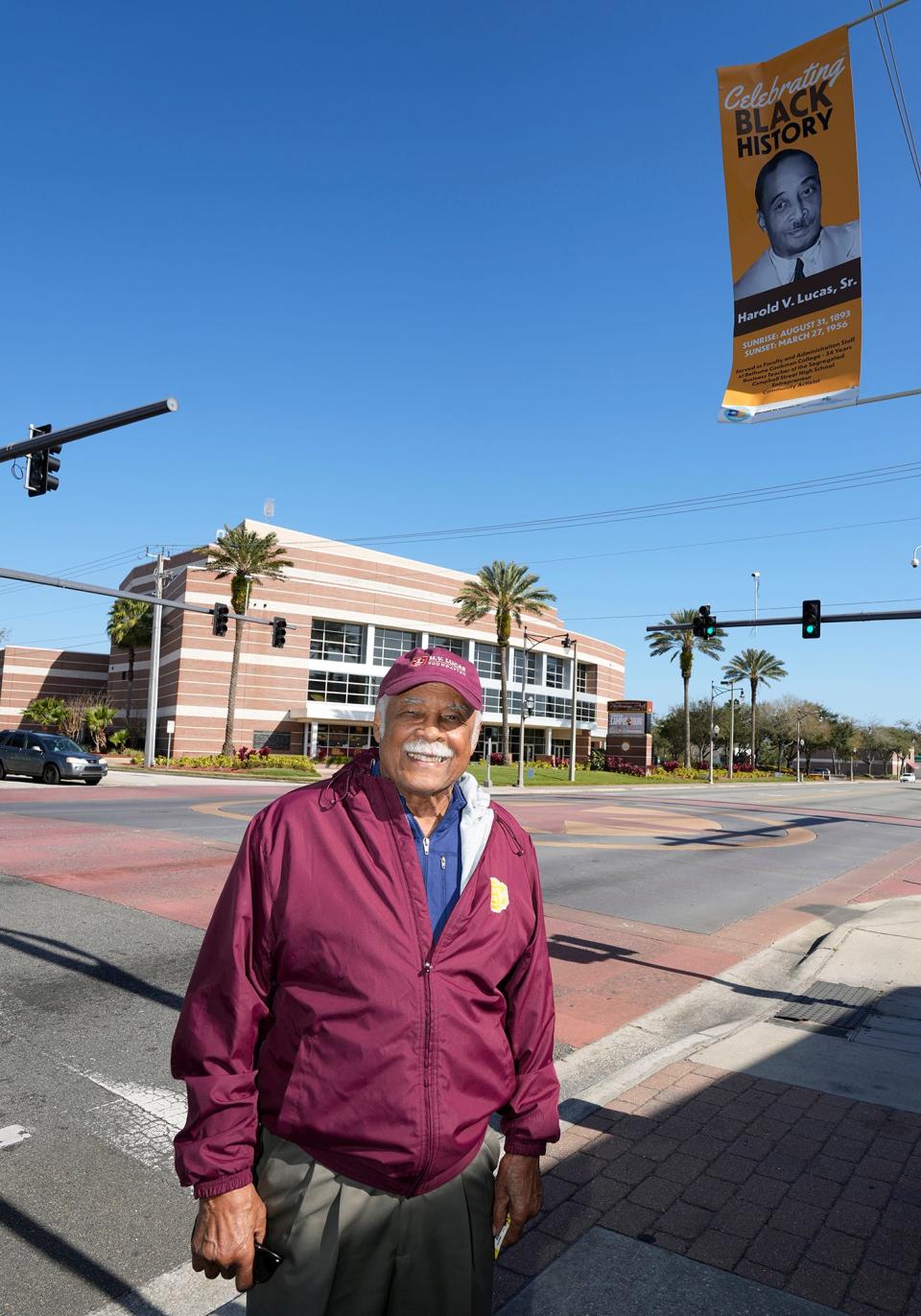
It's the fourth year banners have hung during February to honor local Black pioneers who made an impact on Daytona Beach and beyond.
"This is an important project to acknowledge our city's diverse past and recognize the people who shaped our community," said Daytona Beach City Manager Deric Feacher. "It is our duty to ensure their legacies are not forgotten."
City Commissioner Paula Reed attended the banner unveiling a few weeks ago.
"It's really something to hear the stories the families tell," Reed said. "There's a lot of history here in this city."
Showcasing local heroes
Reed knew some of the 18 people being honored with the banners, all of whom are deceased now. She knew Freddye Moore, who represented the same zone Reed does now on the City Commission.
Mayor Derrick Henry said another person on the list, teacher and librarian Nettie Ryan, "is just a hero of mine."
"I'm proud how we showcase those citizens," Reed said.
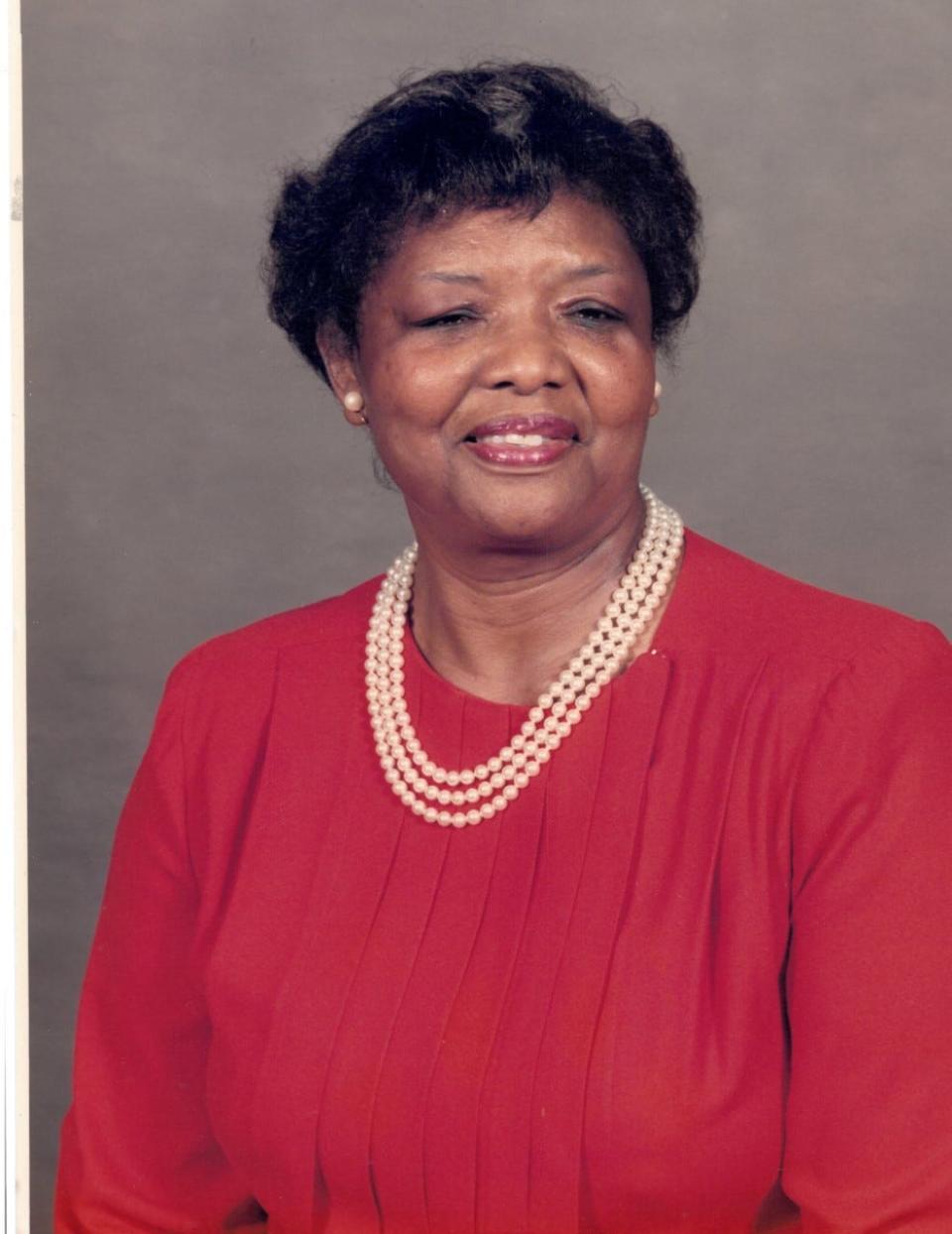
Harold Lucas, Jr., who is 91 years old, is proud to see his father's photo on one of the banners that have been on display for the past few weeks.
His father, Harold Lucas, Sr., taught people to type and write shorthand for 25 cents a week. He also taught typing at a local school.
"We used to have to carry the typewriters from Bethune-Cookman to Campbell Street High School," said Lucas, who was the football coach at Bethune-Cookman from 1961 to 1997.
The local Black leaders who made an impact
Here's a roundup of the 18 leaders whose banners will remain on International Speedway Boulevard through the end of February. The information is based on short biographies posted on the city's website.
Dr. Norwaird Biggins was born in 1919, and he died in 1992. Biggins and Dr. Stimon Meeks teamed up to establish Biggins and Meeks Pharmacy in 1952 on what was then Second Avenue, now known as Mary McLeod Bethune Boulevard.
Emma Brinkley was born in 1945, and she died in 2020. Brinkley was a local Democratic Party leader who was known for canvassing neighborhoods to recruit volunteers for voter registration. Her efforts are credited for thousands of registrations.
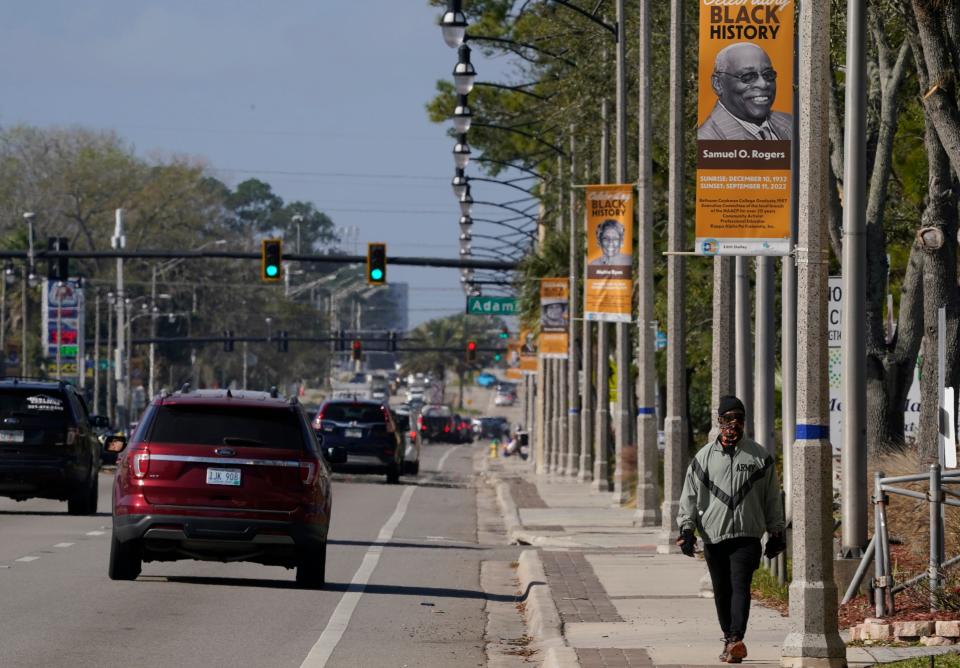
Edwin Charles was born in 1933 and died in 2019. When he was 13 he was inspired by seeing Jackie Robinson play baseball in Daytona Beach with the Montreal Royals during spring training in 1946.
Charles wound up playing for the Kansas City Royals and the New York Mets. He was the starting third baseman for the World Series-winning Mets in 1969.
Charles Cherry, II, was born in 1956 and died in 2023. Cherry had a law degree from the University of Florida, and he was the publisher of the Daytona Times and the Florida Courier. Cherry also co-founded Tama Broadcasting, Inc., once one of the largest privately owned Black radio groups in the United States.
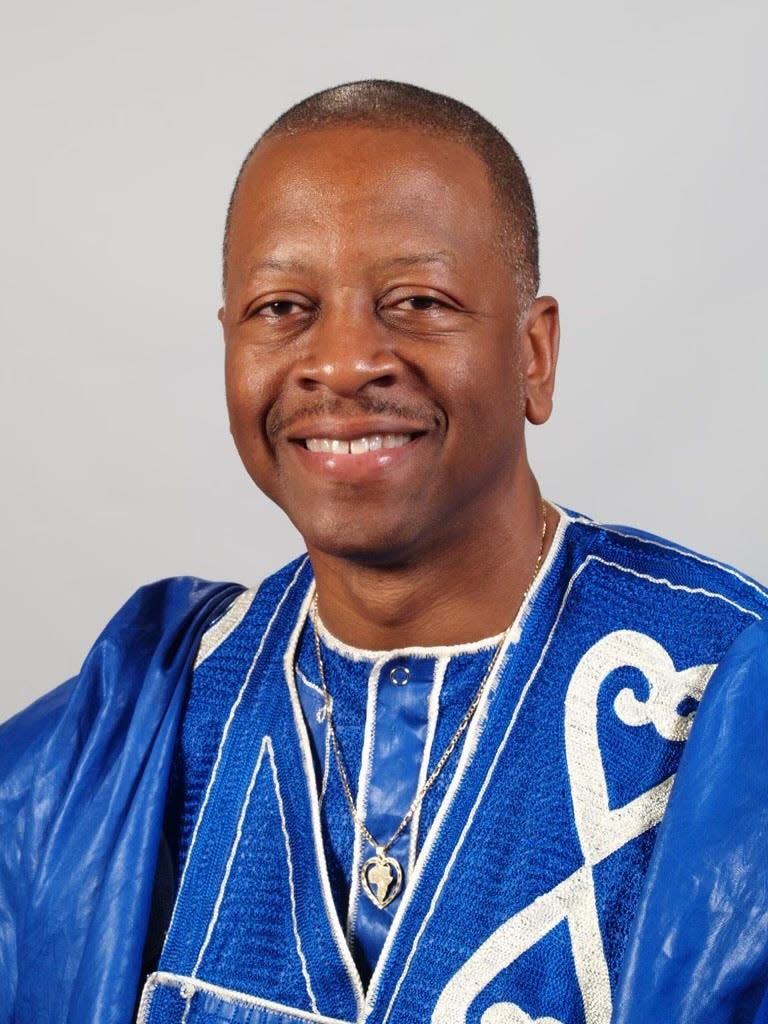
Dr. Neill Crosslin was born in 1915 and died in 1993. Crosslin opened one of the first healthcare centers in Midtown.
Lucius Davis was born in 1924, and he died in 1983. He was president of the Student Government Association at Bethune-Cookman College, where he went on to become the school's General Alumni Secretary, Director of Public Relations, Dean of Men and Director of Housing.
Groveland Four case attorney
Horace Hill was born in 1924 and died in 2005. Hill attended Bethune-Cookman College, became an attorney, served as a lawyer for the NAACP and represented clients in hundreds of civil rights cases throughout Central Florida.
Hill also collaborated closely with then-NAACP attorney Thurgood Marshall in the Groveland Four case, which involved four young Black men falsely accused of raping a white teenage girl.
Harold Lucas, Sr., was born in 1893 and died in 1956. Lucas grew up in New York, attended New York University, and was working as a stenographer in New York City's Woolworth Building when his brother recommended him to Mary McLeod Bethune to establish the first accounting system at Bethune-Cookman College.
He moved to Daytona Beach in 1920 and launched both the accounting system at the college and its business program. He worked at the school for 34 years, and also ran a home-based printing business.
Dr. Stimon Meeks was born in 1925, and died in 1980. Meeks and Biggins opened Biggins and Meeks Pharmacy, which was a community cornerstone that supported youth sports and various community initiatives.
Freddye Moore was born in 1927 and died in 2023. In 1984, Moore became the first Black woman elected to the Daytona Beach City Commission. She was the first Black woman to serve as chairperson of the Volusia County Council. She was also an administrator in Volusia County Schools.
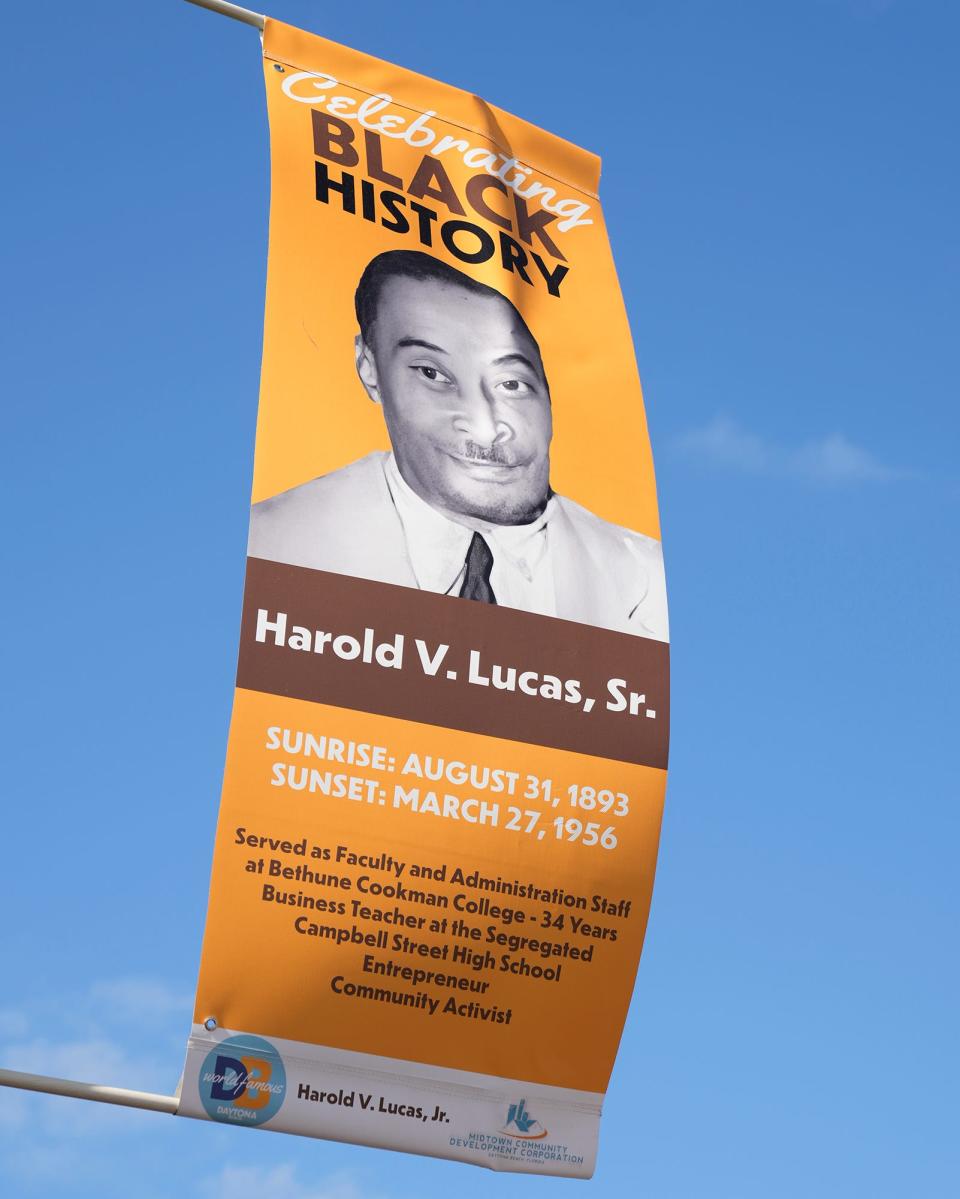
Dr. John Parnell was born in 1931 and died in 2020. He grew up in Daytona Beach, attended Morehouse College in Atlanta, became a doctor and returned to Daytona Beach in 1965 to establish a medical practice. In 1980 he built a medical office on the site of his childhood home on Orange Avenue.
Parnell was also a campus physician at Bethune-Cookman University.
William Prince was born in 1884 and died in 1954. Prince was a mathematics professor at Morehouse College and Edward Waters College in Jacksonville. He also taught advanced math at the segregated Daytona High School, which was later renamed Campbell Street High School. In 1928, Prince organized the high school's first football team.
Activists, mentors and educators
Ralph Robinson was born in 1942 and died in 1999. Robinson was a school custodian, community activist and lifelong NAACP member, serving as personal security for the branch president in Daytona Beach. He co-founded the Neighborhood Basketball Association, coaching and mentoring hundreds of young Black males.
Samuel Rogers was born in 1932 and died in 2022. Rogers grew up in Daytona Beach, and became an educator, counselor, administrator and civil rights activist who mainly worked in Miami.
After he retired, Rogers returned to Daytona Beach to serve the community. He sat on multiple boards and was on the executive committee of the Daytona Beach NAACP for more than 20 years.
Nettie Ryan was born in 1925 and died in 2017. Ryan was a teacher and librarian, she ran a childcare facility from her home, and she volunteered for the Guardian Ad Litem program and Rape Crisis Center Task Force.
Peggy Wesley was born in 1927 and died in 1988. Wesley taught at Bethune-Cookman College, Florida A&M University and the Volusia County School System starting in 1956. She later became a school system administrator.
Another Black Volusia County pioneer: 'I was considered less than' Black 81-year-old remembers 1960 DeLand lunch counter sit-in
Janice Wilson was born in 1957 and died in 2014. Wilson was an educator for more than 30 years. She taught at Spruce Creek High School, Atlantic High School, Silver Sands Middle School and Mainland High School.
Freddie Worthen was born in 1934 and died in 2013. Worthen graduated from the segregated Euclid High School in DeLand at just 14 years old, and from Florida A&M University at 18.
He went on to have a 22-year career in the U.S. Army, retiring as a Lieutenant Colonel. He then got his law degree at Howard University. Worthen worked in private practice and as a state prosecutor in Volusia County before becoming a judge in 1989, a position he held until 2005.
You can reach Eileen at Eileen.Zaffiro@news-jrnl.com
This article originally appeared on The Daytona Beach News-Journal: Daytona Beach celebrating local Black leaders with street banners

